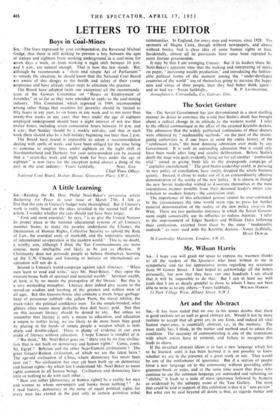A Little Learning
SIR.—Reading the Rt. Hon. Philip .Noel-Baker's persuasive article Budgeting for Peace in your issue of March 27th, I felt at first that the cuts in Unesco's budget were shortsighted. But if Unesco's work is really based on the ideas revealed in the second half of the article, I wonder whether the cuts should not have been larger.
" First and most essential," he says, " is to give the United Nations its proper place in the national educational systems of all Unesco's member States; to make the peoples understand the Charter, the Declaration of Human Rights, Collective Security to uphold the Rule of Law, the essential unity of mankind, and the imperative necessity of international co-operation in the modern world." This is, no doubt, a worthy aim, although I think the Ten Commandments are more concise, more intelligible and likely to be just as effective. If Christianity does not persuade people to behave themselves, learning up the U.N. Charter and listening to lectures on international co- operation will not do it.
Second is Unesco's world-campaign against adult illiteracy. " When men learn to read and write," says Mr. Noel-Baker, "they open the treasure-house both of spiritual and material wealth." Spiritual wealth, at least, is by no means the prerogative of the literate. But this is a very misleading metaphor. Literacy does indeed give access to the stored-up wisdom and learning of the greatest and noblest men of all ages. But this treasure-house also contains a much larger garbage- heap of poisonous rubbish—the. yellow Press, the moral nihilist, the muck-raker, the political confidence man. To the simple-minded, what glitters often seems more' desirable than dull heavy gold. Not that on this account literacy should be denied to any. But unless we remember that literacy is only a means to education, and education a means to nobler living, we are likely to do more harm than good by placing in the hands of simple people a weapon which is both sharp and double-edged. There is plenty of evidence in our own midst of literacy without education. I hope Unesco is mindful of it. " We think," Mr. Noel-Baker goes on, " there can be no true civilisa- tion that is not built on democracy and homan rights." Come, come, Sir, Egypt ? Babylon and the other Near-Eastern civilisations ? The great Graeco-Roman civilisation, of which we are the -latest heirs ? The age-old civilisation of China, where democracy has never been seen yet ? No civilisation has ever yet been built up on democracy and human rights—by which last I understand Mr. Noel-Baker to mean rights common to all human beings. Civilisation and democracy live little or nothing to do with each other. " How can either [democracy or human rights] be a reality for men and women to whom newspapers and books mean nothing ? " As 1 read history, democracy in the sense of equal political rights for every man has existed in the past only in certain primitive tribal communities. In England, for every marl and woman, since 1928. The sponsors of Magna Carta, though without newspapers, and almost without bdoks, had a clear idea of some human rights at least. Incidentally, almost all its provisions have since been repealed by more-literate governments.
It may be that I am wronging Unesco. But if its leaders share Mr. Noel-Baker's apparent view that the making and interpreting of marks on paper, " increasing wealth production," and introducing the fashion- able political forms of the moment among the " under-developed countries of the world " are of themselves going to increase the happi- ness and virtue of their people, then they had better think again— and so had we.—Yours faithfully, R. P. LIVINGSTONE. Annaghdown, Corrandulla, Co. Galway, Eire.


































 Previous page
Previous page